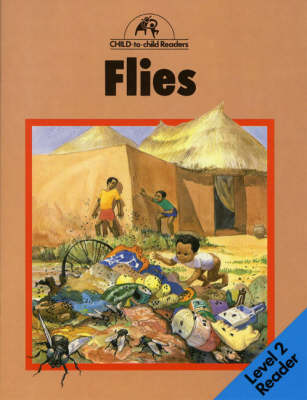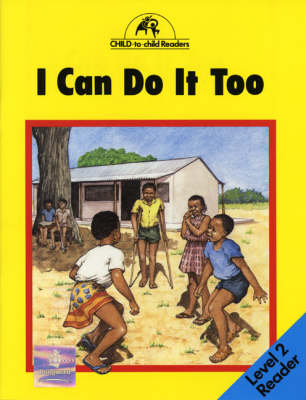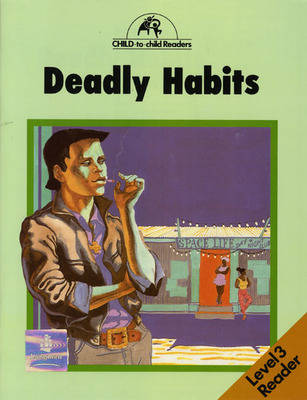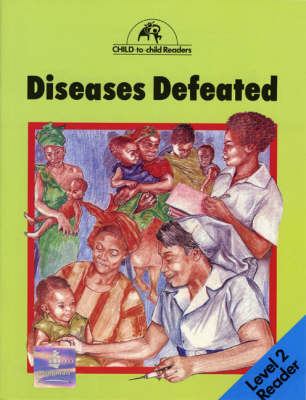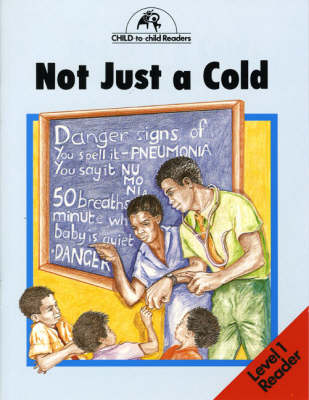Child to Child Readers
5 total works
Each book has been written by an experienced educationalist in conjunction with a panel of medical and language specialists. The books have been graded into three reading levels, and each deals with a different health topic of relevance to children in Africa.
The Readers can be used as an integral part of a primary Science, Social Studies, Environmental Science, Home Economics or Health Science curriculum.
This Reader tries to show how children can help to improve their environment by fighting flies which carry disease.
The story follows the fortunes of five evil spirits-Fever, Fury, Filth, fall and Fear-who have cooked up a recipe guaranteed to create trouble in the form of small, fast-breeding flies. One by one, they are defeated by clever children who have the power to destroy them by applying their knowledge of hygiene which they share with others.
Each book has been written by an experienced educationalists in conjunction with a panel of medical and language specialists. The books have been graded into three reading levels, and each deals with a different health topic of relevance to children in Africa.
The Reader can be used as an integral part of a primary Science, Social Studies, Environmental Science, Home Economics or Health Science curriculum.
This Reader tells the stories of three children- Ali, Aminah and Peter- who have one thing in common: they all have a physical handicap, which they learn to accommodate with the help and support of other children.
I Can Do It Too is different from other Readers in the Child-to-Child series in that it addresses the issue of attitudes to handicap. Future Readers may explore this area.
Each book has been written by an experienced educationalist in conjunction with a panel of medical and language specialists. The books have been graded into three reading levels, and each deals with a different health topic of relevance to children in Africa.
The readers can be used as an integral part of a primary Science, Social Studies, Environmental Science, Home Economics or Health Science curriculum
This is the story of how Innocent- who is anything but innocent- comes to grief, and how Sampson - Who is anything but strong - has a near brush with the law.
It is told by Joe who at eleven is level-headed and quick-witted. His wry sense of humour permeates the serious health message of the dangers of smoking, heavy drinking and casual sex.
Deadly Habits is at the higher language level than other Readers in the serious and is aimed at 12 to14-year-olds.
Diseases Defeated Level 2 Reader
by V Mugisa, A Waljee, and Colette Hawes
Each book has been written by an experienced educationalist in conjunction with a panel of medical and language specialists. The books have been graded into three reading levels, and each deals with a different health topic of relevance to children in Africa.
The Readers can be used as an integral part of a primary Science, Social Studies, Environmental Science, Home Economics or Health Science curriculum.
This story shows how most diseases can be defeated if mothers and children are vaccinated or immunised at the right time.
The children from Kampala Primary School in Uganda made up a play about a meeting of killer diseases, in which the main topic of discussion is how to combat the threat posed to the diseases by WHO, Unicef and Child to Child. Their play forms the basis of this Reader.
Not Just a Cold Level 1 Reader
by Hugh Hawes, A Waljee, and Colette Hawes
Each book has been written by an experienced educationalist in conjunction with a panel of medical and language specialists. The books have been graded into three reading levels, and each deals with a different health topic of relevance to children in Africa.
The Readers can be used as an integral part of a primary Science, Social Studies, Environmental Science, Home Economics or Health Science curriculum.
Acute Respiratory Infection (ARI)-mostly in the form of pneumonia-accounts for millions of deaths in babies and young children because these illnesses have no 'simple cure'. Children need antibiotics.
ARI symptoms are easily recognised, however, and if treatment is given quickly many children can be saved. In this story Andrew shows us how, when he is left in charge of his baby sister and she develops pneumonia. Fortunately, Andrew knows the signs, so he makes sure she gets antibiotics and lives.
